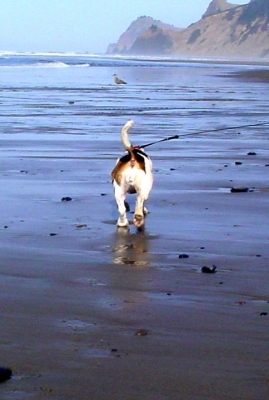Surviving the Troubled Teens

In the past week, I have talked to three very distressed dog people. Two of them are fostering dogs, and the other just adopted a dog. The issues they're experiencing range from inappropriate chewing, to serious separation anxiety, to attention seeking behavior, to general "what the heck do I do with this dog?"
I patiently gave my best advice to all of them, and everyone has calmed down. However, I still wonder if they really heard the most important thing I said to all three of them.
"He/She is an adolescent."
I say this a lot, to a lot of people, because most people get frustrated over doggy behavior during doggy adolscence. It's no different than parents with children. Sure kids are a lot of work when they're babies and toddlers. They need a lot of attention during grade school, too. But it is in the scary, confusing forest of adolescence that both kids and parents can feel lost and in need of serious guidance.
So it is with adorable puppies. Around 4 -5 months of age, the puppy starts losing interest in it's owners (just like kids). The former puppy is becoming a teenager and is much more interested in the wide world and all it has to offer. Attention spans shorten while interests expand. The need to chew increases right along with energy levels. And, just like human teens, puppyhood lessons seem to disappear from their brains completely and require constant reminders.
The reason I don't think people really hear my message is because it's often followed with a question like, "Yes! He's definitely a teenager, but can we fix this?" Believe me, I understand what they're saying and I am overwhelmed with joy that they are willing to help their dog be good. I just wonder if a little piece of understanding might be missing.
In general, we don't "fix" teenagers, canine or human. Instead, we coach them, guide them, teach them, redirect them, keep them engaged, keep them busy and give them clear consequences when they make undesirable choices. With humans, we seem to have a deeper understanding of the fact that what this person is today will be different in time. It's not JUST the lesson, it's also the process of maturing. They are growing up on their own, but we are helping to shape the finished product.
THAT is what I want people to understand about adolescent dogs. They will grow up. They will regain some focus. They will chew less. They will slow down. But, they will need your guidance, attention and coaching to grow up well.
I certainly don't want dog owners to assume a dog will grow out of bad behavior without any training. But I also don't want an owner to think that the dog they have at 10 months old is the dog they're going to have at 2 years old. Behavior changes constantly.
What I'm trying to say is that while it was very, very important for me to make sure my daughters studied hard, cleaned their rooms, thought for themselves and minded their manners...they are not the same people at 24 & 21 that they were at 17 & 14! Yes, their lessons at that age made a HUGE difference in their development. At the same time, however, they no longer have the personalities, wants, fears, mind-sets of teenagers.
So...if you have an adolescent dog (age 4 mo - 2 yrs), take a deep (deeper) breath. If you are consistant, patient and dedicated now, it will pay off later. You won't have to deal with adolescent issues forever, because it doesn't last forever. Remember that you are not "fixing" the dog you have today, but shaping the dog you want to have in the future.




